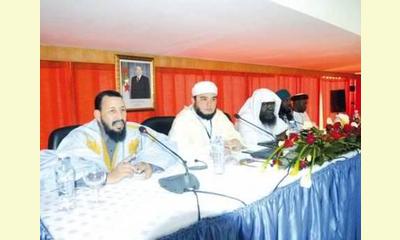|
|
Imams and preachers from the Sahel meet in Algiers to combat religious fanaticism
un article par Salima Tlemçani, El Watan (abridged)
For the first time, scholars, preachers and imams recognizing the Maliki rite from the Sahel countries, including Mali, Niger, Burkina Faso, Mauritania and Algeria met the day before yesterday in Algiers, for a seminar on religious extremism, its causes, effects and treatment. The Algerian hosts were unanimous in denouncing "the destructive thought that has become widespread in the Sahel region and has tarnished the image of Islam and Muslims."

click on photo to enlarge
During the opening session, Ahmed Tikhemrine a preacher from Algeria, explained that "this initiative was discussed at a meeting in Mecca between the followers of the Maliki rite who were concerned about the situation in northern Mali, particularly the invasion of the region by groups of fanatics. We all agree on the necessity of a league to fight extremism, fanaticism and crime that threaten the peace, security and stability in the region. . ."
In the same spirit, the Nigerian Sheikh Daoud focused on the "evil" consequences of these extremist movements, which cannot be fought by thought alone. "Only religion can expose these fanatics. We must defend religious references in our region to cut off the preachers of violence and destruction. . . .
In an outspoken speech that was followed with great attention by the participants, Abdelmalek El Ramdane Djazaïri highlighted the "serious abuses" of the fanaticism whose followers are treated as "Kharijite". "By the rigidity of their practice, they have violated the precepts of religion, which should preach tolerance . . . "
Similar remarks were made by Sheikh Mouadou Soufi from Burkina Faso, where religious violence is now the biggest concern. He explains that the fanatics, like highwaymen, are using a uniform to deceive their victims. They first dress as military or police to steal people, while others use Islam to attract young people into their criminal activities. "Everybody should know that our religion teaches us neither violence nor terrorism, but the love of others and tolerance . . . .
The Imam Moussa from the Great Mosque of the University of Noukchott, Mauritania, spoke in the same direction by returning to the definition of fanaticism, equated it with terrorism, which, according to him, is categorically rejected by the Muslim religion. The Imam of the Mosque of Agadez, Niger, Sheikh Boureina Abadou Daouda spoke of the two rebellions in the north of the country has experienced, stating that "they have nothing to do with religion, but rather are related to political rights" . . .
The Final Declaration of the Algiers meeting included the following: "the seminar participants urged all scholars, imams and preachers of the Sahel region recognizing the Maliki rite to remove all the ambiguities of religion, "to spread the culture of peace, tolerance, harmony and coexistence with other religions and communities . . . "
(Click here for a French version of this article)
|








|
DISCUSSION
Question(s) liée(s) à cet article:
In the face of armed conflicts in the Sahara-Sahel, Can a culture of peace be established?
* * * * *
Commentaire le plus récent:
As often occurs, in the Sahara-Sahel, in the face of the terrible violence of religious extremists in Mali, there is a dialectic so that the more the violence, the more the demand for a culture of peace.

|
|









